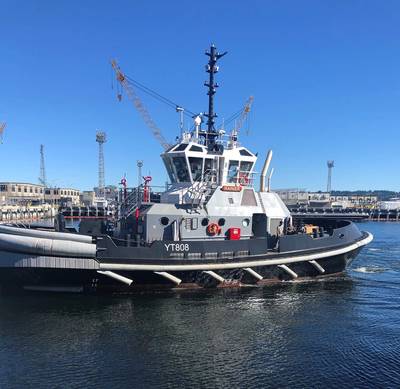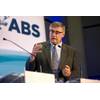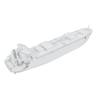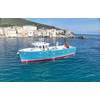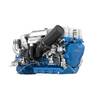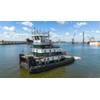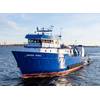Propulsion Profile: US Navy's Tier 4 Tugs
Built by Dakota Creek Industries in Anacortes, Wash., the first of the U.S. Navy's new fleet of six YT 808-class tugs was delivered in October after completing the last construction phase. Measuring 90 feet long and 38 feet 3 inches wide, the YT 808 vessel is powered by twin Cat 3512E marine engines, each rated at 1,810 horsepower. The engines drive two Schottel SRP 340 fixed-pitch z-drive thrusters providing a top speed of 12.5 knots and an expected bollard pull of 40 metric tons.
The new series of Robert Allan Ltd.-designed tugs are the Navy's first vessels built to meet the U.S. EPA Tier 4 Final diesel engine emission regulations. The use of the 3512E engines will drastically reduce emissions at the naval installations where they operate. The YT 808's will replace the Navy's 45 – 55-year-old YTB class tugs at the Portsmouth Naval Shipyard in Maine and the Pacific Northwest.
Cat Tier 4 engines are working in dozens of new tugs around the Unites States today since the Tier 4 emissions regulation went into effect in 2017. The first Navy YT 808 is the latest Cat powered Tier 4 tug to go into service, as it is already performing its mission for the US Navy at Naval Base Kitsap in the Puget Sound.
"The proven performance and reliability of the 3512E engines will ensure the YT 808 tugs are ready to perform their mission of assisting Navy ships and submarines in and out of port," said Caterpillar Marine Governmental Technical Lead, Scott Roberts.
The new engines installed in the vessels will receive support from the worldwide Cat dealer network, ready to assist and manage the engines' performance to prevent downtime. "Our goal is to provide customers with high-performing equipment and solutions that are easy to own, operate, and maintain. With digital solutions, customers can monitor engine health and review engine history data and early warning signs to allow proper intervention before failure," Roberts said.


